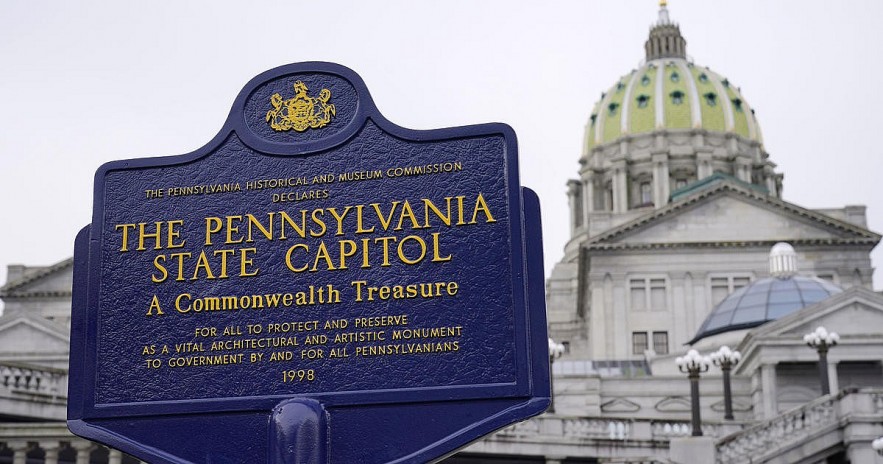Top 5 Most Important New Laws of Pennsylvania Taking Effect In 2024
 |
| Most Important New Laws Taking Effect In Pennsylvania 2024 |
| Contents |
The close of a year is always a time for endings and beginnings. This is true for many things including state government.
Here are some of the new laws taking effect in Pennsylvania in 2024.
Most Important New Laws Taking Effect In Pennsylvania 2024
1. Public safety and crime
Reforming probation
In an effort to "create more fairness in Pennsylvania's criminal justice system, ensure probation serves as a tool to help Pennsylvanians re-enter their communities, and pave the way for more Pennsylvanians to get second chances," Governor Shapiro signed "landmark probation reform and clean slate legislation."
"Porch pirating" is illegal
Porch pirating is now illegal in Pennsylvania according to a new law. Mail theft now carries special penalties, including stealing a package, purse, or letter.
The new rule increases punishment if the thief has previous convictions for mail theft and targets repeat offenders using a grading system.
READ MORE: What is RICO Lawsuit - Trump Files Against Hillary Clinton
Medical Cannabis
Act 63 of 2023, Senate Bill 771, was signed into law by Governor Shapiro on December 14. This will facilitate the sale of medical marijuana by farmers within the state.
The sponsors of the act claim that some farmers were permitted by the state's Department of Health to sell directly to patients while others were not permitted to do so before the bill was signed into law. The legislation expands the state's permitting program to enable all farmers to sell their goods uniformly, which solves this issue.
Crackdown on retail thievery
A new statute creates the position of Deputy Attorney General within the Attorney General's Office, whose duty it will be to manage a group of prosecutors assigned to different parts of Pennsylvania in order to prosecute cases involving retail theft.
Fingerprint checks by police for applicants
The Municipal Police Officers’ Education and Training Commission (MPOETC) now has the legal ability to run fingerprint-based criminal history checks on prospective municipal police officers thanks to this new law.
No rectal, prostate, or pelvic inspections without permission
Before conducting a pelvic, rectal, or prostate examination, health care providers supervising clinical training programs or professional instruction must get specific informed consent, either verbally or in writing.
A note from the bill's sponsors said, "It's a shocking and disturbing realization for many people that medical students may perform a pelvic exam on a female patient who is under anesthesia for an unrelated procedure."
READ MORE: Why Is It That In Some States You Can Buy Alcohol in a Pharmacy But Not in An Actual Liquor Store?
Coverage for human milk from pasteurized donors
mandates that pasteurized donor human milk (PDHM), when prescribed by a doctor, be paid for with Medical Assistance in both inpatient and outpatient settings for medically vulnerable newborns under the age of one year. The mother of the infant must be physically or medically incapable of producing enough breast milk to meet the kid's needs in order to be eligible for coverage. In compliance with the 2020 Keystone Mother's Milk Bank Act (Act 7) of Pennsylvania, the donor milk must also be acquired from a milk bank licensed in that state or by way of a hospital licensing procedure.
Reporting of maternal morbidity
Maternal morbidity problems are considered reportable incidents under this rule. A group of medical disorders known as severe maternal morbidity can make pregnancy more difficult. These disorders include unanticipated labor delivery outcomes that have a major negative impact on a woman's health, either immediately or over time.
Transferring military paramedics and EMTs to civilian
By virtue of this law, emergency medical care providers are guaranteed to have their military education and training taken into account when completing the necessary prerequisites for professional qualifications.
2. Education
Scheduling flexibility within school districts
The bill modifies state law so that schools are no longer required to achieve both requirements; instead, they can finish the school year in 180 days or 900 hours at the elementary level and 990 hours at the secondary level.
Child Care Tax Credit
The Child and Dependent Care Enhancement Tax Credit in Pennsylvania was extended by legislation that Governor Shapiro signed. For instance, the refundable state tax credit of a low-income family with two children enrolled in daycare would increase from $630 to $2,100.
Teachers are permitted to dress religiously
Repeals Section 1112 of the Public School Code of 1949, which forbids teachers from carrying out their official duties as teachers while donning any clothing, marks, emblems, or insignia that might suggest they are members of a particular religious group or sect.
For military families who are reassigned, in-state tuition
Amends Act 287 of 1982 to mandate that resident tuition rates be charged to veterans, their spouses, and dependent children, military personnel, and civilian personnel, and their spouses, for enrollment at public higher education institutions, state-related or state-owned institutions, "Private institutions," and community colleges. This requirement is contingent upon the student's residency in Pennsylvania on the date of the deposit confirming their intent to enroll, beginning enrollment within the corresponding term for which the deposit was made, and continuing enrollment at the institution continuously.
3. Society and government
Voter registration by automatic
In Pennsylvania, you may be automatically registered to vote if you renew your driver's license or state identification card, though you are free to decline.
During any DMV procedure, the voter registration screen will not be shown to those who are not allowed to vote.
Eliminating racial language from actions
Targeted under a new rule are "restrictive deed covenants," which were "written into deeds, barring the sale of properties to people of a particular race, ethnicity, or religious group, and were a tool of systemic racism."
The new rule permits a homeowner association or property owner to remove a restrictive covenant from their title without having to pay a fee by filing a document with the Recorder of Deeds office in their county. Additionally, the bill reimburses county recorders for their expenses.
Extension of the Rent Rebate Program and Property Tax
The Property Tax/Rent Rebate Program doubles payments for many of the 400,000 Pennsylvanians who now qualify and was extended to almost 175,000 additional seniors in the state.
The property tax/rent rebate program has been expanded to elevate the maximum rebate for seniors from $650 to $1,000. It also raises the annual income threshold for homeowners and renters to $45,000 and links it to increases in living expenses.
4. Food
Food Repeal of the Frozen Dessert Law
A 1965 law known as the "Frozen Dessert Law" was revoked. It mandated that businesses sample and test frozen desserts on a monthly basis. Since there has been a significant improvement in food sanitation rules and regulations at both the state and federal levels since the mid-1960s, according to the bill's sponsor, it is no longer necessary.
Favored Organic brand
Together with the Pennsylvania Preferred Program, this act created the Pennsylvania Preferred Organic Program indefinitely.
5. Other laws
Officer Preparedness
Governor Shapiro signed HB 863 on December 14th, reducing the physical fitness standards for potential police officers.
Before the bill was signed into law, potential police officers had to place in the 30th percentile on exercises including sit-ups, bench presses, and long- and short-distance running, according to the bill's sponsors.
Prospective police officers now just need to score in the 15th percentile or higher, according to the revised guidelines.
Safeguards for Women in Prison
Act 47 of 2023, HB 900, commonly known as the Dignity for Incarcerated Women Act, was signed into law by Governor Shapiro on December 14.
The act's sponsors claim that it restricts the use of shackles, cavity searches, and solitary confinement on pregnant or postpartum inmates.
In addition, care, postpartum recuperation, feminine hygiene items, and family visitation are covered by the new law.
Porch Stealing
On December 14, Senate Bill 527, which makes porch pirating a crime, was signed into law by Governor Josh Shapiro.
Act 41 of 2023, a new law, focuses mostly on mail theft, including the theft of letters, packages, and bags.
Theft of mail can now be considered a felony, misdemeanor, or summary violation under the new law, depending on how frequently it occurs and how much was taken.
Canine law
Governor Josh Shapiro signed Senate Bill 746 into law on Monday, October 23, modernizing and amending Pennsylvania's dog law.
According to the new rule, dogs must have a license either at the time of adoption or purchase, or by the time they are three months old, whichever comes first.
A copy of the dog licensing application must also be provided by anyone who sell or offer dogs for adoption, according to the legislation.
On the Radar Bills
While a number of new laws may have an immediate influence on day-to-day living in 2019, it is likely that some highly anticipated proposals will not make it to the January 1, 2024, deadline.
The Democratic-controlled House approved a bill in June to raise Pennsylvania's minimum wage to $11 per hour. Nevertheless, the Senate still needs to approve the bill before Governor Shapiro might sign it.
Additionally, a number of Democratic state legislators have proposed legislation to legalize marijuana in Pennsylvania in 2024, but as of right now, none of them has enough Republican backing.
In summary
Governor Josh Shapiro signed a number of measures in mid-December, and they went into effect in early 2024. Pennsylvania passed new legislation pertaining to a variety of topics, including food, education, and public safety, which went into effect in January 2024.
 Top 13 Craziest and Dumberest Laws in the U.S. Top 13 Craziest and Dumberest Laws in the U.S. The United States, a vast, dynamic, and heterogeneous nation, even permits municipalities and states to enact their own legislation. |
 The Top 20 Most Absurd Laws in the US That Remain in Effect Today The Top 20 Most Absurd Laws in the US That Remain in Effect Today Which US laws are the strangest? the If you live in the United States, have you ever broken the law because you didn't know it ... |
 What are the Differences Between State Laws and Federal Laws in the U.S What are the Differences Between State Laws and Federal Laws in the U.S There are fifty states plus a few territories that make up the United States. Every state has to deal with its own courts and legal ... |



























